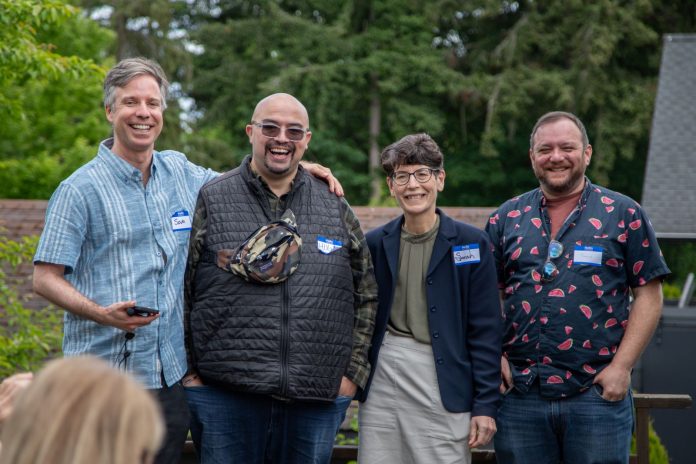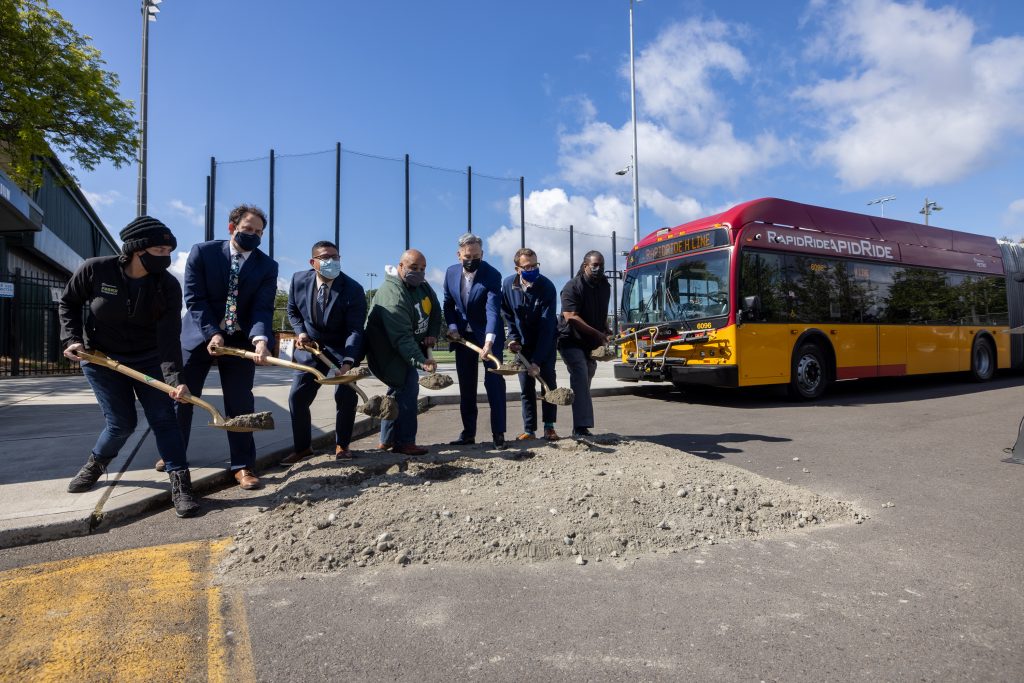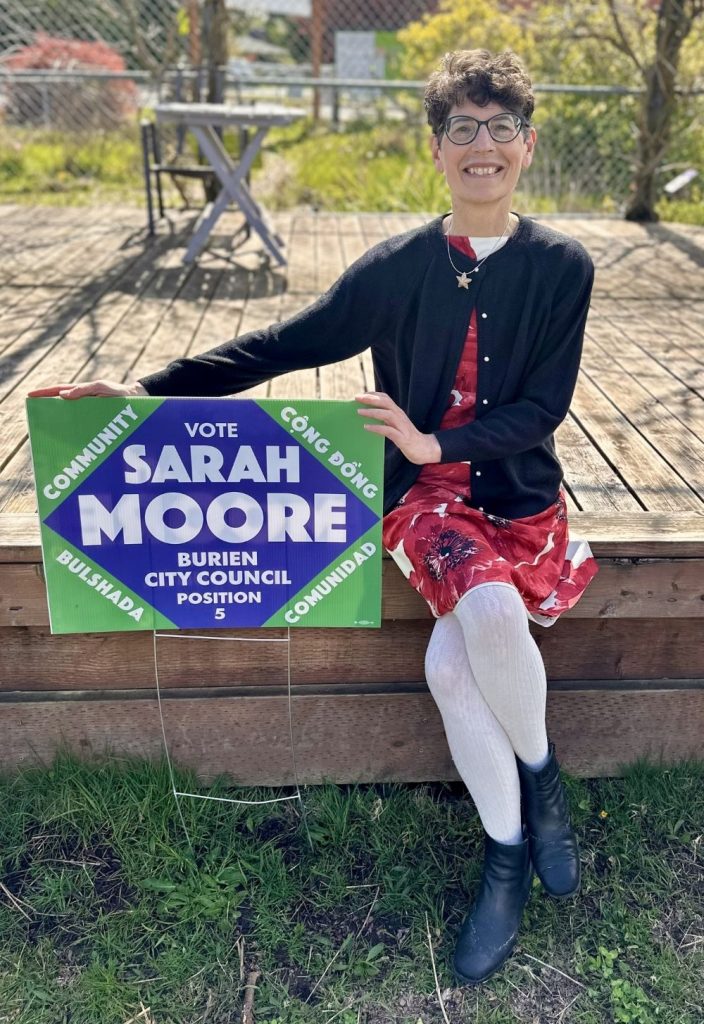
Progressive city council candidates took commanding primary leads, suggesting Burien has a good shot at a pro-housing, urbanist majority in November.
Burien, the ethnically diverse city of 53,000 people just south of Seattle, is at a political crossroads.
After four years of controversy over homeless encampments, raising the minimum wage, and zoning changes to accommodate more density, the results of the city’s August 5 primary election results indicate Burien’s relatively conservative city council may swing to progressive control in November.
Three Burien city council seats were contested in the primary (and one other position, with just two candidates, will also be on the November ballot). An unofficial progressive slate has emerged, and though the four candidates don’t agree on every issue, they’re in regular contact to discuss strategy and policy.
As of August 15, the results from Council Position 1 favored incumbent progressive Hugo Garcia who had 4,399 votes (48.7%), and will likely face Burien planning commission vice president Jessica Ivey, who received 2,311 votes (25.6%).
In Council Position 3, progressive community advocate Sam Méndez was in the lead with 4,350 votes (48.4%) over nurse and public safety advocate Marie Barbon who had 2,766 votes (30.8%) to fill the seat currently held by Jimmy Matta.
In Council Position 5, incumbent progressive candidate Sarah Moore was firmly in the lead with 5,658 votes (63%) and will face Gabriel Fernandez in the November general election. Fernandez garnered 2,079 votes, good for 23.3%.
In the fall, progressive Rocco DeVito will face incumbent Stephanie Mora, the most consistently conservative member of Burien’s city council, for Position 7 (there was no primary because only two candidates filed). Given the general pattern for other progressive challengers and centrist incumbents, DeVito would appear to be the favorite.
Kelsey Vanhee, a Burien resident who posts live reactions to Burien City Council meetings at Burien Cat Lady on Bluesky, is a member of The Urbanist Elections Committee, and is a volunteer for Sarah Moore’s campaign, said that progressives performed surprisingly well in the primary. (The Urbanist Elections Committee endorsed Moore and DeVito. Garcia did not return a questionnaire and was ineligible.)
“It was honestly way better than I expected,” Vanhee said. “Because historically, when we have odd-year elections and primaries, we see even lower voter turnout.”
The existing 5-2 conservative majority on the council was responsible for passing a series of controversial bans on public camping within city limits, which all the progressive candidates have criticized and vowed to repeal if elected. The conservative majority has also opposed recent efforts to expand homeless shelter capacity and services in the city.
Burien’s current council also approved a new comprehensive plan in 2024, paving the way for increased density and a goal of making 75% of single family zones available for middle housing options.
But the current council is working to walk back some zoning changes, Vanhee noted. “Stephanie Mora, who’s the furthest right on council, brought the process forward,” she said. “They’re trying to rush the comp plan amendment so that this council gets a vote for it.”
In addition, though Burien voters passed a ballot measure by a wide margin in February that would increase the minimum wage and put the city on par with Tukwila, Renton, and Seattle, the city filed a lawsuit in King County Superior Court claiming the initiative failed to repeal the city’s existing minimum wage law. A ruling is still pending.
And this November’s ballot will also contain a public safety levy that would increase the size of the police force by two officers annually until 2031 and cost the average Burien homeowner $474 per year.

Plus, as Burien works to improve pedestrian safety while South King County sees a sharp rise in pedestrian injuries and deaths, the city was dealt a blow in December when Burien safe streets activist Steven Bird was struck and killed in road rage incident.
In this context, The Urbanist spoke with two Burien city council candidates who came out on top. Hugo Garcia did not respond to requests for an interview.
Méndez, who led in the Position 3 race, is a progressive community activist and attorney. He didn’t get the Urbanist’s endorsement (it went to challenger Rashell Lisowski) but his platform is focused on housing density and safe streets, as his Urbanist questionnaire showed. Lisowski finished third and was eliminated. Méndez will face pediatric nurse Marie Barbon, a business-backed candidate who supports increasing police funding even further, in the general election.
“The main things I’m running on and talking about the most when I’m knocking on the doors is housing affordability, safer streets for bicyclists and pedestrians, and government accountability and transparency,” Méndez said.
He’s opposed to the camping ban and committed to voting to repeal it if elected.
“I think it’s inhumane, and I also think it’s ineffective,” Méndez said. “Homeless folks who are obviously still living in Burien have just made themselves less visible.”
Méndez opposed Burien’s rejection of $1 million in grants from King County to address homelessness. “We should have taken those resources, and we should have built those shelters,” he said. “I think that’s serious mismanagement on the council’s watch.”
Méndez also said he’s opposed to current efforts to water down Burien’s comprehensive plan. “I think the current Council majority is seeking to, frankly, weaken the comp plan, because the comp plan includes a number of changes to local zoning law, a lot of it being mandated by state laws that were passed,” he said. “And I fully support those state laws.”
If Méndez is elected to the council he would support a range of pedestrian safety improvements including “Actual separated bike lanes that have either parking spots or plant boxes that actually separate bicycles from cars.” He also wants to look into automated speed cameras and low-cost options like speed bumps.
He’s optimistic after the primary results. “I think there’s a very good chance that all four [progressives] will win, and we’ll have a big majority here in Burien, and I think we can expect a number of different policy changes once we are sworn in.”
Sarah Moore, who led her challenger with 63% of the vote, is also encouraged by her strong showing. “It shows that people want candidates that connect with them and listen to their needs and do the hard work of delivering at a local level.”

In terms of affordability, Moore is opposed to weakening zoning reform. “We should continue our zoning work so that there’s more density,” she said. “And then support people that are looking for ways to creatively make housing affordable,” she said, noting that Burien should build more relationships with housing nonprofits and regional organizations.
Moore said she’s committed to improving pedestrian safety. “Statewide, there are some new, very intriguing laws about speed limits that could be lower in cities, and I would love us to investigate that as a city. I’d also like us to see if we can designate some streets as low-traffic streets,” Moore said. She’s also supportive of expanding Burien’s protected bike lane network, she noted.
Like Méndez, she supports repealing the camping ban if elected and wants to rebuild relationships with the county after rejecting funds. “We need to approach this issue regionally and say, what are all of our regional resources? What are the gaps? And how are we going to fill those gaps?” Moore said.
After a solid showing in the primary, she’s hopeful she’ll be part of a progressive majority or at the very least keep voicing concerns for progressive issues on the council. “I was a little astonished at the margin by which I came through the primary,” she admits.
Hugo Garcia, who didn’t fare quite as strongly as Moore, with 48% of the vote, but he still heads into the general election with the upper hand. He has two and a half months to sell voters on his record and his positions on housing affordability, support for a raised minimum wage, and defending immigrant residents from the Trump administration’s crackdown. He’ll face Jessica Ivey, who is endorsed by leaders of Burien’s more conservative bloc: Mayor Kevin Schilling and councilmembers Alex Andrade and Linda Akey.
If Garcia, Moore, Méndez, and progressive Rocco DeVito all prevail in November, that would give them a solid 4-3 majority to chart a new policy direction, including on the aforementioned homelessness, housing, and pedestrian safety issues.
“Sarah, Hugo, Rocco, and Sam have all expressed that they want to overturn this camping ban,” Vanhee said, noting that this will likely be a pivotal issue in the general election. “For me, those are the stakes of winning back a progressive majority.”
Correction: This article initially mixed up the opponents for Garcia and Méndez in the later discussion. This was corrected at 9am.

Andrew Engelson
Andrew Engelson is an award-winning freelance journalist and editor with over 20 years of experience. Most recently serving as News Director/Deputy Assistant at the South Seattle Emerald, Andrew was also the founder and editor of Cascadia Magazine. His journalism, essays, and writing have appeared in the South Seattle Emerald, The Stranger, Crosscut, Real Change, Seattle Weekly, the Seattle Post-Intelligencer, the Seattle Times, Washington Trails, and many other publications. He’s passionate about narrative journalism on a range of topics, including the environment, climate change, social justice, arts, culture, and science. He’s the winner of several first place awards from the Western Washington Chapter of the Society of Professional Journalists.
